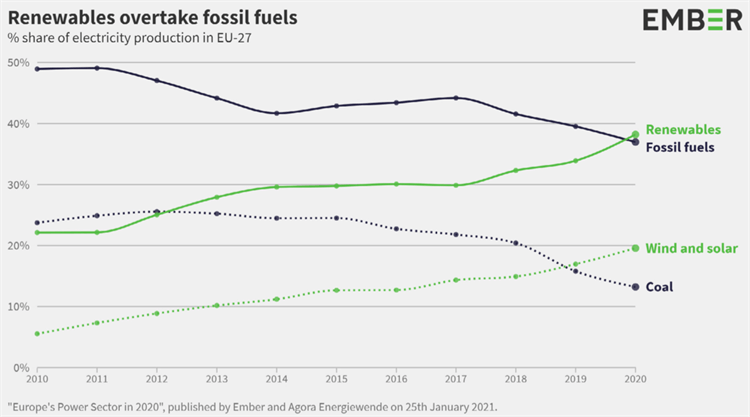
In the EU, while large regional differences exist, (electricity being on average 3 times the price of gas) in 2020 for the first-time renewables overtook fossil fuels in the generation of electricity reaching 38% share.
In some countries, solar PV is already the cheapest and most competitive form of electricity and the rapid technological advancements suggest that it will continue to be in the years to come. Additionally, preliminary data from Integrated Assessment Model (IAM) REMIND by PIK (Luderer et al, under revision) shows that electricity is faster and easier to decarbonise than non-electric fuels.
Interestingly electricity as a whole is anticipated to become the cheapest energy carrier by 2040 leading the way for a number of applications to become even more compelling and competitive. The push for cost-competitive and green electricity is in part driven by carbon pricing on fossil fuels, and by the EU Green Deal target to become carbon neutral by 2050. In order for the EU to become carbon neutral by 2050 industry must however join the effort and also become carbon neutral. This process has to start now to avoid potential carbon lock-ins as the lifetime of industrial plants is often 20-40 years.
Madeddu states that “Industry is responsible for circa 30% of the end-sectors CO2 emissions in Europe, when process and indirect CO2 emissions from electricity and central heat use are included.” With only 19% of European industry currently supplied by electricity, industry needs to step up its electrification initiatives in order to keep up with reaching the 2050 climate change goals. “78% of the energy demand (excluding feedstocks) is electrifiable with technologies that are already well established, with 99% of electrification able to be achieved with the addition of technologies currently under development” says Madeddu.
This provides a huge potential for new applications and systems that build on the perspective of electrification. Madeddu estimates that achieving this substantial electrification would not only cut CO2 emission but also reduce the industry energy consumption by up to 20%.
In the DryFicicency project, under the guidance of AIT and SINTEF input and boundary conditions of the industrial processes were analysed for the installation of three demonstration heat pump systems (at Wienerberger, Agrana and Scanship) in different industrial drying processes. In addition to their regular production facilities and under real industrial production conditions both open and closed loop high temperature heat pump systems were installed. All relevant data is being recorded and regularly analysed to validate the targeted energy savings and to evaluate the key performance indicators defined. This should add important data to support future Industry electrification initiatives that can be fostered by creating a level plain field in the energy market and a competitive electricity price.
See the full presentation of Dr Silvia Madeddu here
About Dr Silvia Madeddu, Potsdam Institute for Climate Impact Research (PIK)
Silvia is a researcher specialized on decarbonisation strategies for energy-intensive industries. She holds a PhD in Materials Science and Engineering and currently works in the Energy Systems modelling group at the Potsdam Institute for Climate Impact Research. She investigates energy transformation pathways for industry and recently published the first bottom-up analysis of the electrification potential in the European industry.
Project Coordinator
Veronika Wilk
AIT Austrian Institute of Technology GmbH


| Cookie | Duration | Description |
|---|---|---|
| cookielawinfo-checkbox-analytics | 1 year | This cookies is set by GDPR Cookie Consent WordPress Plugin. The cookie is used to remember the user consent for the cookies under the category "Analytics". |
| cookielawinfo-checkbox-necessary | 1 year | This cookie is set by GDPR Cookie Consent plugin. The cookies is used to store the user consent for the cookies in the category "Necessary". |
| cookielawinfo-checkbox-others | 1 year | This cookie is set by GDPR Cookie Consent plugin. The cookie is used to store the user consent for the cookies in the category "Others". |
| cookielawinfo-checkbox-performance | 1 year | This cookie is set by GDPR Cookie Consent plugin. The cookie is used to store the user consent for the cookies in the category "Performance". |
| viewed_cookie_policy | 1 year | The cookie is set by the GDPR Cookie Consent plugin and is used to store whether or not user has consented to the use of cookies. It does not store any personal data. |
| Cookie | Duration | Description |
|---|---|---|
| CONSENT | 16 years 4 months 8 days 15 hours 5 minutes | These cookies are set via embedded youtube-videos. They register anonymous statistical data on for example how many times the video is displayed and what settings are used for playback.No sensitive data is collected unless you log in to your google account, in that case your choices are linked with your account, for example if you click “like” on a video. |
| IDE | 1 year 24 days | Used by Google DoubleClick and stores information about how the user uses the website and any other advertisement before visiting the website. This is used to present users with ads that are relevant to them according to the user profile. |
| VISITOR_INFO1_LIVE | 5 months 27 days | This cookie is set by Youtube. Used to track the information of the embedded YouTube videos on a website. |
| YSC | session | This cookies is set by Youtube and is used to track the views of embedded videos. |
| yt-remote-connected-devices | never | These cookies are set via embedded youtube-videos. |
| yt-remote-device-id | never | These cookies are set via embedded youtube-videos. |